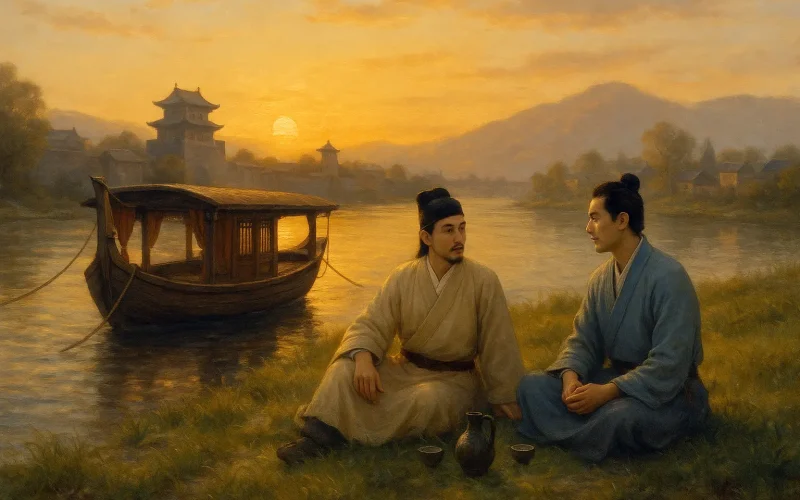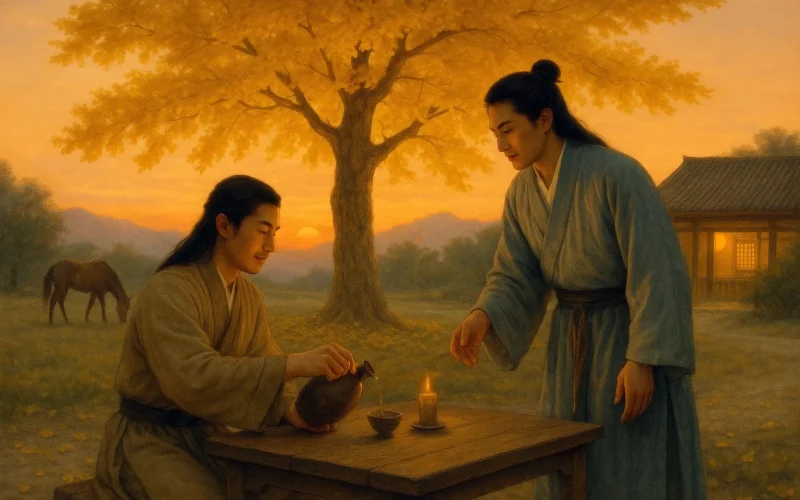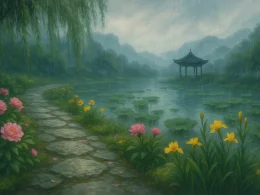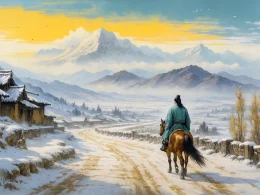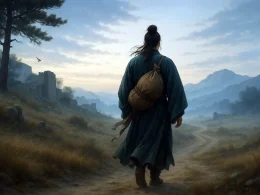In a happy reign there should be no hermits;
The wise and able should consult together…
So you, a man of the eastern mountains,
Gave up your life of picking herbs
And came all the way to the Gate of Gold --
But you found your devotion unavailing.
…To spend the Day of No Fire on one of the southern rivers,
You have mended your spring clothes here in these northern cities.
I pour you the farewell wine as you set out from the capital --
Soon I shall be left behind here by my bosomfriend.
In your sail-boat of sweet cinnamon-wood
You will float again toward your own thatch door,
Led along by distant trees
To a sunset shining on a far-away town.
…What though your purpose happened to fail,
Doubt not that some of us can hear high music.
Original Poem
「送綦毋潜落第还乡」
王维
圣代无隐者,英灵尽来归。
遂令东山客,不得顾采薇。
既至金门远,孰云吾道非。
江淮度寒食,京洛缝春衣。
置酒长安道,同心与我违。
行当浮桂棹,未几拂荆扉。
远树带行客,孤城当落晖。
吾谋适不用,勿谓知音稀。
Interpretation
This poem was written by Tang Dynasty poet Wang Wei to console his friend Qiwu Qian after Qi failed the imperial examinations in the capital. The work reflects Wang Wei's deep friendship and sympathy, conveying comfort through delicate emotions and vivid imagery.
First Couplet: "圣代无隐者,英灵尽来归。"
Shèng dài wú yǐn zhě, yīng líng jìn lái guī.
In this prosperous age, no talents remain hidden; all outstanding souls serve the state.
The poet uses the politically clear and socially stable environment of the High Tang period as background, vividly portraying the spirit of the times where scholars actively participated in state governance rather than withdrawing from society to live in reclusion.
Second Couplet: "遂令东山客,不得顾采薇。"
Suì lìng Dōngshān kè, bùdé gù cǎiwēi.
Thus even Eastern Mountain's recluse must forsake his hermit life.
This couplet skillfully employs two classical allusions: Xie An's retreat to Eastern Mountain and the story of Bo Yi and Shu Qi gathering ferns on Western Mountain. These references subtly convey the poet's admiration for his friend's noble character while simultaneously revealing his friend's eagerness to achieve success in political endeavors.
Third Couplet: "既至金门远,孰云吾道非。"
Jì zhì jīnmén yuǎn, shú yún wú dào fēi.
Having approached the Golden Gate, who says our path was wrong?
The poet uses this line to comfort his friend who failed to pass the imperial examinations, expressing understanding of his friend's disappointment while simultaneously conveying unwavering confidence in their shared intellectual capabilities and moral convictions.
Fourth Couplet: "江淮度寒食,京洛缝春衣。"
Jiānghuái dù Hánshí, Jīngluò féng chūnyī.
You endured Cold Food Festival by the rivers; mended spring robes en route to Luoyang.
These lines paint a vivid picture of the friend's arduous travels in pursuit of examination success, with the poet expressing genuine sympathy for both the physical hardships endured and the emotional toll experienced by his friend.
Fifth Couplet: "置酒长安道,同心与我违。"
Zhì jiǔ Cháng'ān dào, tóngxīn yǔ wǒ wéi.
We share wine on Chang'an's road, yet our hearts now diverge.
At this moment of farewell, the poet uses the character "违" (meaning to go against, diverge, or separate) to profoundly express the deep sorrow of parting, while simultaneously demonstrating the strength and depth of their friendship during this difficult goodbye.
Sixth Couplet: "行当浮桂棹,未几拂荆扉。"
Xíng dāng fú guì zhào, wèijǐ fú jīng fēi.
Soon I'll pole my cassia boat to visit; wait briefly by your thornwood gate.
Wang Wei comforts his friend by making concrete plans for a future reunion, offering this tangible promise of another meeting to help alleviate the pain of their current separation and his friend's disappointment over the examination failure.
Seventh Couplet: "远树带行客,孤城当落晖。"
Yuǎn shù dài xíngkè, gū chéng dāng luòhuī.
Distant trees engulf the traveler; the lone town bathes in sunset glow.
Through this masterful depiction of scenery, the poet creates an intensely lonely and expansive atmosphere of farewell, where natural imagery serves to heighten and intensify the emotional weight of their separation.
Eighth Couplet: "吾谋适不用,勿谓知音稀。"
Wú móu shì bùyòng, wù wèi zhīyīn xī.
Though my plans go unfulfilled now, never say true friends are few.
In these final lines, the poet offers wise counsel about resilience, urging his friend not to lose confidence after a single setback but to maintain faith in his own talents and abilities, while also trusting that life will present more opportunities in the future.
Holistic Appreciation
The poem resonates with profound emotion, blending heartfelt sympathy for a friend's misfortune with hopeful encouragement for the future. Wang Wei masterfully depicts the political clarity of the High Tang period to illuminate the shifting mentality among scholars, while employing classical allusions and scenic imagery to honor his friend's noble character. Stylistically, the poet expresses both the sorrow of parting and words of comfort through refreshingly natural language.
The introduction of historical references to "Eastern Mountain recluse" and "fern-gathering" subtly reveals the inner conflict between his friend's desire for reclusion and worldly obligations. Lines like "soon I'll pole my cassia boat to visit" demonstrate Wang Wei's thoughtful consolation through concrete plans of reunion, showcasing his tender concern.
Beyond its emotional depth, the poem creates a poignant atmosphere of solitary farewell through vivid imagery like "distant trees engulf the traveler" and "the lone town bathes in sunset glow." These carefully crafted scenes not only intensify the poetic sentiment but also heighten the melancholic beauty of separation, adding profound layers to this meditation on friendship and transience.
Artistic Merits
- Delicate Emotion and Heartwarming Consolation: The poet demonstrates profound sympathy and care while comforting his friend, revealing deep friendship through genuine emotional expression.
- Skillful Use of Allusions: By employing historical references to "Eastern Mountain recluse" and "fern-gathering," the poet enriches the poem's cultural significance while highlighting his friend's noble character.
- Profound Scenic Depiction with Ethereal Ambience: Imagery such as "distant trees engulfing the traveler" and "a solitary city bathed in sunset glow" vividly portrays the loneliness and vastness of separation, intensifying the poem's emotional impact.
- Concise yet Profound with Progressive Depth: The poem's tightly structured composition gradually builds emotional layers, moving from consolation for failure to the poignancy of farewell, creating a deepening emotional resonance throughout the verses.
Insights
Through exquisite emotional expression and vivid imagery, this poem conveys the preciousness of friendship and the profundity of human connection. Facing disappointment and separation, the poet's sincere words of comfort remind us how crucial a friend's support and understanding become during times of failure or adversity.
Moreover, the poem serves as a timeless reminder to seek new hope amidst difficulties, to cherish the care of those around us, and never to lose faith in the future because of temporary setbacks. Wang Wei's verses ultimately teach us that true friendship provides both the anchor in life's storms and the compass pointing toward brighter horizons.
Poem translator
Kiang Kanghu
About the poet

Wang Wei (王维), 701 - 761 A.D., was a native of Yuncheng, Shanxi Province. Wang Wei was a poet of landscape and idylls. His poems of landscape and idylls, with far-reaching images and mysterious meanings, were widely loved by readers in later generations, but Wang Wei never really became a man of landscape and idylls.






